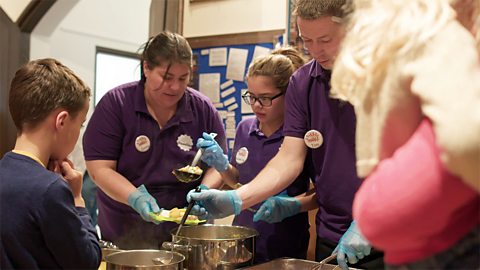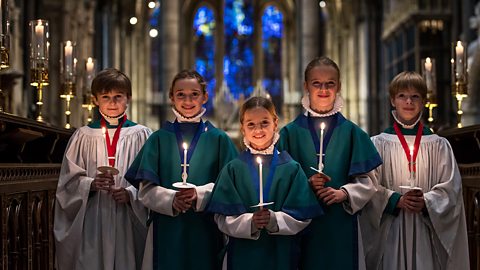Christianity and Christmas
For Christians, Christmas is significant as it celebrates the incarnation, or birth, of Jesus Christ.
Watch Jonnie as he celebrates the Christian festival of Christmas with his friends, family and the local community.
Hi, my name is Jonnie and I'm a Christian. It's getting close to Christmas, which is when we celebrate Jesus' birthday. At this time of year when it's cold outside, we also remember the people in our community that might not be looking forward to a happy Christmas and need some help.
All through the winter, my church runs a food bank where we give out free food to the people who need it. We also have emergency accommodation for the homeless. It's our way of helping people who don't have anywhere to go and don't have anyone to share Christmas with. As Christians, we try to follow Jesus' example and what he taught us about showing God's love to everyone.
Church members have donated money and food for the food bank and even Christmas presents. My friends here have volunteered to help collect all kinds of gifts for families who wouldn't otherwise have any presents to open on Christmas Day. It feels good to be helping people, especially at Christmas time.
I will be spending Christmas with my family and friends at special Christmas services at the church. We all know how fortunate we are and so we take time to pray for everyone who is alone or in need.
Christians believe that we should love everyone no matter who they are. The word used for love in the New Testament of the Bible is a translation of the original Greek word agape. It's not a going out on a date kind of love or the love you have for your family. Agape means giving to other people without expecting anything back.
Volunteering to give out presents or to run the food bank isn't going to end homelessness or fix all the problems in our community. But it does make Christmas a little better for a lot of people.
I hope that they don't feel so alone and that they know God loves them.
What does Christmas celebrate?
For Christians, Christmas is significant as it celebrates the incarnation. This means God being made man in the form of Jesus Christ. Christians believe that Jesus brought light into the world through his actions and teachings. He also brought light through his death and rising, so that the sins of humans could be forgiven, and proving to Christians that eternal life exists.
At Christmas, Christians remember the story of Jesus’s birth. Jesus was born to a woman called Mary, who was engaged to Joseph, a carpenter in the town of Nazareth in Galilee. Mary was visited by an angel who told her that she would become pregnant by the power of the Holy Spirit and give birth to a baby called Jesus, who would be the son of God. Jesus was born in Bethlehem because Joseph and Mary had travelled there to take part in a census which the Roman rulers had ordered.
When Mary and Joseph arrived in Bethlehem, the local inn was full. Jesus was laid in a manger (a feeding trough used for animals) instead of a cot, which has led many Christians to believe that Jesus was born in a stable or a cave where animals were kept.

How is Christmas celebrated?
In preparation for Christmas, many Christians mark the four weeks leading up to Christmas Day. This is known as Advent. For most Christians, Advent is a time of great excitement and expectation.
In the UK Christmas Day is celebrated on the 25th December each year, but not all Christians celebrate the birth of Jesus on this day. Many Eastern Orthodox Christians for example mark the event on the 7th January.
There are many customs and traditions that are associated with the celebration of Christmas, but some of these are not religious. For example, modern images of Santa Clausand reindeer are common at Christmas, but they bear little connection to the Christian celebration. Christian traditions, that many non-religious people also perform, include church services, exchanging gifts and nativity plays.
While many people chose to spend Christmas celebrating with their families, many Christians see it as a time to spread God’s love in their communities. On Christmas Day, many local churches open their doors to help those less fortunate than themselves. Some congregations or communities run soup kitchens for the homeless, and others may visit the elderly at home. Christmas is traditionally celebrated over twelve days, ending on a festival in January called Epiphany, when Christians believe that the Magi (also known as the Three Kings or Three Wise Men) visited the infant Jesus.

Other Christian festivals
The Christian festival of Easter remembers Jesus rising from the dead, three days after he died by crucifixion on a cross. The date of Easter Sunday varies from year to year. It is celebrated on the first Sunday after the full moon, on or after 21st March.
Leading up to Easter Sunday, various celebrations bring Christians together, such as Good Friday, when Christians gather to give thanks for Jesus’ sacrifice on the cross, sometimes staging re-enactments of the crucifixion.
Christian festivals in pictures

Image caption, Midnight mass
Midnight mass is the first service of Christmas. It is held late on the night of Christmas Eve, the day before Christmas Day, close to the hour of midnight. Many churches with choirs will hold carol services when songs celebrating Christmas and the birth of Jesus are sung.
1 of 5
Play Bitesize secondary games. game
Have fun playing science, maths, history, geography and language games.
